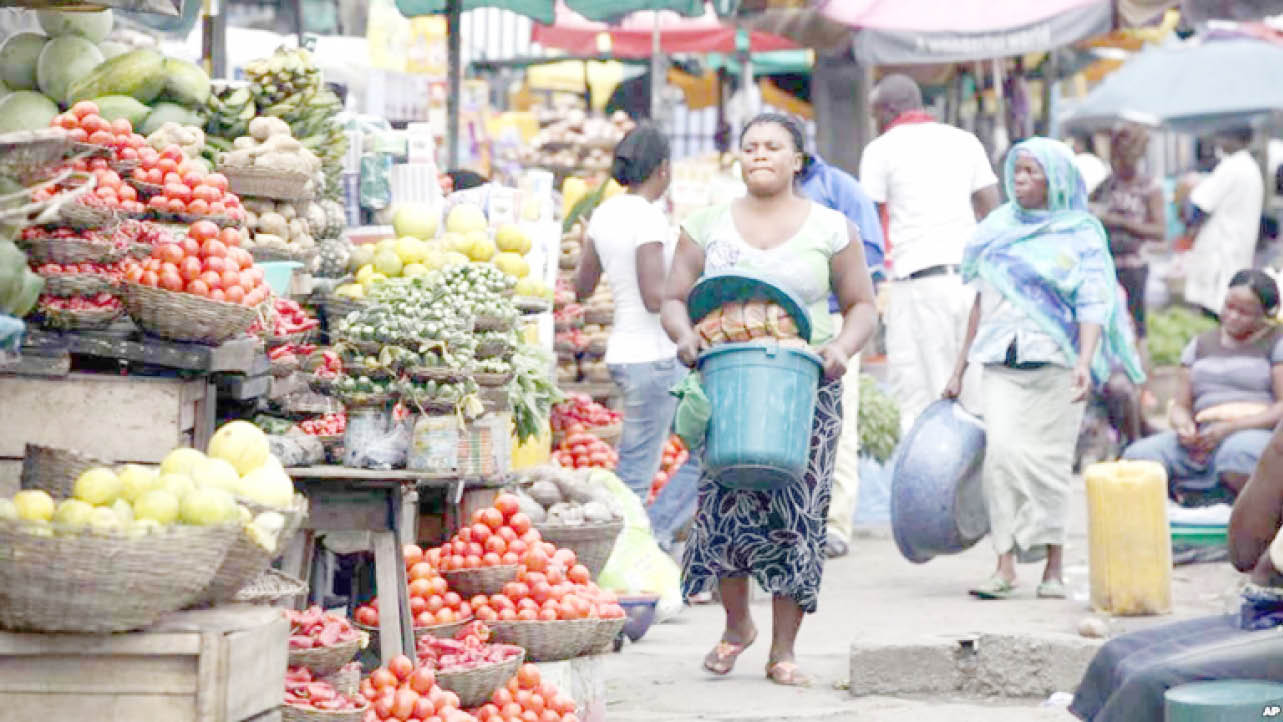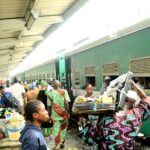More than a month after the removal of fuel subsidy, Nigerians are expressing mixed feelings over the failure of the federal government to fulfill its promised palliatives to cushion its effects on citizens, Daily Trust Saturday reports.
The removal of fuel subsidy has led to an increase in inflation and hike in the cost of goods and transportation.
Speaking to our correspondent in Uyo, the capital of Akwa Ibom State, some residents said Nigerians were smiling and suffering as the cost of fuel increased the rate of hardship on the people.
A media practitioner in Uyo, Patrick Titus, lamented that the masses were worst hit by the subsidy removal and not the government or its officials.
- What Nigerians say about radical decisions by President Bola Tinubu?
- Our officer injured, not killed in clash with thugs – Police
He said subsidy removal had affected the cost of living.
He said, “We have not seen the palliatives and what it is made up of. In Nigeria, we are becoming used to suffering and smiling. Nobody is happy. And even if the government gives palliatives, how many people would benefit?”
A self-employed graphic designer, Mr Uwem Asian, said the failure of the government to provide palliatives to cushion the effect of the subsidy removal one month after the implementation, showed that it was not a well-planned decision.
“It was obvious that the government did not plan well. If they removed subsidy there should be adequate plans to cushion the effect. Government just removed the subsidy to stop a selected few from benefitting, but now, it is the masses that are suffering.
“After one month into the subsidy removal regime, the situation shows that there was no plan. The masses are suffering. Let’s hope that the money they have saved would be judiciously used,” he said.
A civil servant in Ebonyi State, Mbam Ogodo, said the president should not have removed the subsidy when there was no plan in place to cushion its effects.
A trader, David Okorie, also said citizens were helpless in the face of the hardship occasioned by subsidy removal.
“Nigerians are suffering and there is nothing we can do about it. We can’t fight them or protest,” Okorie said.
A teacher and petty trader, Princess Adebayo Esther Aderonke, said provision of palliatives by the government would go a long way in ameliorating the pains of Nigerians.
In Kano, residents, especially salary earners, are lamenting that their incomes are nothing to write home about as it only caters for one third of their needs.
A primary school teacher who did not want his name mentioned, called on the government to, as a matter of urgency, initiate the policy of price control to discourage businessmen and women from exploiting consumers.

He said, “Initiating a price control system is a form of palliative that will reach everybody. But if you share money or food items, how long will it last? At the end of the day you will discover that it just had a short term effect.
“Honestly, we are suffering. The prices of what your salary used to buy have tripled and you cannot do anything about it.”
On his part, Abdulkarim Musa advised the government to work on a sustainable and more efficient transparent model of disbursing the proposed palliatives so that every citizen would feel its impact.
“For me, the way and manner the palliatives would be distributed is the issue. If we adopt the pattern of how palliatives were distributed during the past administration, no doubt, it will only go to those known by someone at the top. We know how corruption has eaten deep into the system. At the end of the day, it is the poor that suffer.”
In Jigawa, residents are also lamenting the delay in palliative disbursement promised by the federal government as a result of the subsidy removal.
Many parents said they could no longer take their wards to school in their private vehicles but now use alternative means, including hiring tricycles while other children are forced to stay at home.
A 52-year-old man, Mukhtar Wakili, a resident of Dutse metropolis, said six out of his 10 children were at home due to the increase in transportation fare, adding that all of them are in various primary and secondary schools.
“The situation is so bad that sometimes we eat only twice a day. I am very confused and disappointed at the federal government,” he said.
Another resident, Abubakar Kabiru, a 50-year-old man said, “We lose hope in Nigeria daily because there are no changes; rather, the gap between the poor and rich keeps widening,” he said.
In Lokoja, the Kogi State capital, residents are at crossroads over the removal of fuel subsidy without accompanying palliative measures to cushion its effect.
Findings revealed that socio-economic activities have been affected as farmers, market women, shop owners, motorists and commuters are under the heavy burden of the fuel subsidy removal.
Majority of the people who spoke to Daily Trust Saturday over the removal of fuel subsidy praised the federal government for the decisive decision, but complained that the idea should have been anchored on palliatives to cushion the effect of its consequences.
A former state chairman of the Nigeria Labour Congress (NLC), Comrade Emmanuel Omata, said the hardship emanating from the removal of fuel subsidy was biting hard, and the aged and pensioners were the worst hit.
“It is disheartening to note that a month after such major decision that drives the economy of the country, no palliative measure has been introduced to cushion its negative effects.
“Some are suggesting that various state governments should venture into mass transport schemes to cushion its effects. That is good, but it is just like scotching the snake, not killing it,” he said.
He said the idea of floating mass transport schemes to cushion the effect of fuel subsidy may work in some states but not all.
Comrade Omata, therefore, advised the federal government to create special palliatives for the aged, pensioners and farmers as it is done in developed countries.
A civil servant in the state who simply identified himself as Sefinetu, said the burden of high transport fares since the removal of fuel subsidy was worrisome, making many civil servants to abandon work for some days.
“A month after this unexpected pronouncement by the federal government, nothing seems to be in the offing to reduce the hardship associated with the policy,” she said.
In the same vein, members of the National Union of Transport Owners Association (NUTOA) and National Union of Road Transport Workers Association (NURTWA) are concerned over the drop in patronage of their services due to the removal of fuel subsidy.
Both unions claim that their businesses are being affected as people appear to have reduced the rate at which they travel because of the sudden rise in transport fares.
Daily Trust Saturday gathered that the transport fares for all routes from Lokoja have either tripled or doubled since the fuel subsidy removal. For instance, a trip from Lokoja to Anyigba now attracts N3,000 instead of N1,500, Lokoja to Abuja, which cost between N2,500 and N3,000, now attracts N5,000 and above. A trip from Lokoja to Lagos, which was between N8 and N10,000, is now from N15,000 upwards.

Majority of those who spoke with our correspondent said the permanent solution to the situation was to encourage investment in building refineries and deregulate the oil sector.
“Let the federal government create an enabling environment for individuals, regional governments and cooperate organisations to invest in building refineries so as to make fuel available in abundance so that demand and supply would determine the price of fuel,” Dr James Adajole, an economist in Lokoja said.
An Abuja-based public analyst and economist, Prince Tijani Dauda, said the federal government must ensure that the removal of fuel subsidy is not seen as a single solution but one of the many steps to be taken to improve the economy.
“President Bola Ahmed Tinubu must re-engineer the economy to ensure that there are many suitable options that increase prosperity, growth, industrialisation and diversification.
“There must be a strategic plan in place to ensure that Nigerians can still afford fuel while boosting the economy through infrastructure, improving social welfare programmes and creating an enabling environment for business growth and sustainability,” Comrade Dauda said.
Also, people in Plateau State, like those of other states, are no longer finding live easy since the removal of petroleum subsidy.
A student of the University of Jos, Peter Pricilla, said, “The removal of subsidy is not a bad idea, but government did not prepare its citizens for it. The government just took everybody unawares, and that is why everyone is in pain.
“As a university student, I feel the pain more because all my feeding money is now being spent on transportation to and from school.
“I can no longer buy foodstuff. It is a difficult situation. I wish the government would help the university with buses to convey students to school.”
Mrs Nanchin Nanzim, who teaches in a private school in Jos said, “The removal of subsidy is adversely affecting my job because of high cost of transportation. I have resorted to trekking to school. While battling issues of transportation, the cost of household items, especially food has tripled. The little salary I collect can’t afford anything, the situation is just terrible. I collect salary today and in a week it is finished.
“I want the government to bring palliatives to help citizens, especially the poor. Government must do something to reduce the cost of transportation and living generally.”
Mrs Felicia Falope, a business woman also said, “The way and manner the subsidy was removed was too harsh, no one was prepared, and the government did not put anything in place to help reduce the burden. My business money is being taken away by the high cost of petrol.”
Madam Able Luka, who sells secondhand cloths in Dadin Kowa, Jos, said, “Because of the sudden removal of fuel subsidy, my customers no longer come to buy goods. I am appealing to the government to do something to help us reduce the cost of transportation and cost of living generally. We are starving; we can’t buy food anymore due to its high prices.”
Mrs Nancy Dajan, a self employed quantity surveyor also said, “I am shocked at the sudden removal of fuel subsidy because I was expecting a relief from a new government. How can you just remove petrol subsidy without making adequate provision to cushion the impact. The price of everything has tripled and we are suffering.
“Subsidy removal is good, but Nigeria is not ripe for it now; government needs to bear certain costs for its citizens. Government should take concrete steps to bring relief to the suffering masses. It should introduce buses that use gas so as to reduce cost of transportation,” she said.
Committees have 6 more weeks – Labour
Speaking on the delay of interventions to cushion the effects of subsidy removal, the Organised Labour said the sub-committees set during the last engagement with the government were working round the clock to conclude the mandate given to them.
In an interview with Daily Trust Saturday on Friday, the general secretary of the Trade Union Congress (TUC), Comrade Nuhu Abba Toro, said various sub-committees had six more weeks to conclude their assignments.
He said the committees were on the cost of governance, energy and power, mass transit, social sectors like education, as well as intervention funds.
Comrade Toro told one of our correspondents that the original timeline was eight weeks, adding that the sub-committees just spent two weeks out of what was given to them.
The labour leader explained that it was agreed that there would be a presidential steering committee that would fuse all the ideas, suggestions and recommendations of the sub-committees.
He said, “Majorly, the last discussion we had was to agree on some practical ways to cushion the immediate effect of the subsidy removal. We did highlight some of the immediate areas of intervention; for instance, salary review, cash transfer and those, in our opinions, that are the interventions that could mitigate the itching of the fuel subsidy removal.
“We also have a sub-committee on cost of governance because you will agree with me that if the government needs to tighten its belt, Nigerians automatically also ought to tighten their belts.
“We are going to have a presidential steering committee that will serve as a clearing house. There’s also a secretariat.
“All of these committees will sit and come up with suggestions to the clearing house, which is the presidential steering committee, which of course include all the social partners. They will look at it and forge ahead.
“I can tell you that the committees are already meeting. The sub-committee on cash transfer met yesterday (Thursday). All the committees cannot meet at the same time, but they have scheduled their meetings.
“Don’t forget that we have a timeline, which is eight weeks, when we should consummate all the interventions and hit the ground running. The TUC under the leadership of Comrade Festus Osifo will strive to ensure that it is achievable, by the grace of God.”
Iniabasi Umo (Uyo), Nabob Ogbonna (Abakaliki), Jide Ajia (Lagos), Salim Umar Ibrahim (Kano), Ali Rabiu Ali (Dutse), Tijani Labaran (Lokoja), Yusufu Aminu Idegu (Jos) & Idowu Isamotu (Abuja)

 Join Daily Trust WhatsApp Community For Quick Access To News and Happenings Around You.
Join Daily Trust WhatsApp Community For Quick Access To News and Happenings Around You.


